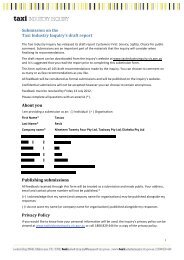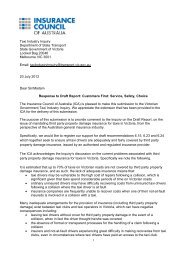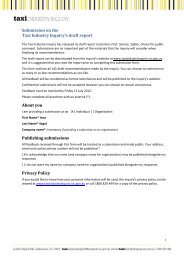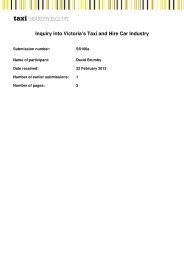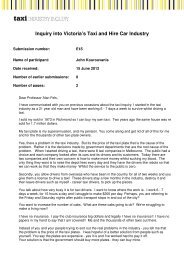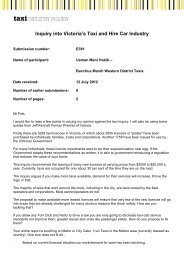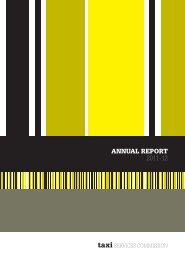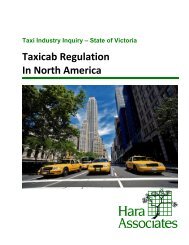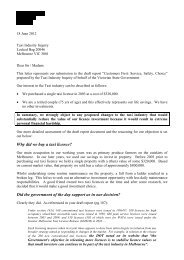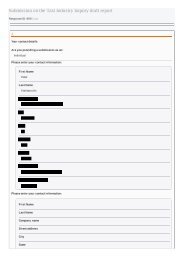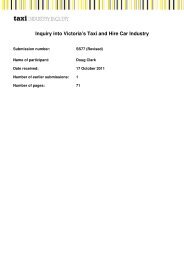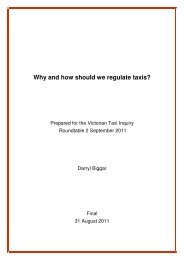Part D â Understanding and improving industry performance (PDF ...
Part D â Understanding and improving industry performance (PDF ...
Part D â Understanding and improving industry performance (PDF ...
Create successful ePaper yourself
Turn your PDF publications into a flip-book with our unique Google optimized e-Paper software.
Many licence owners do not deny their lack of<br />
accountability for service, seeing their role primarily as<br />
being an investor:<br />
I am a license holder that purchased my license as an<br />
investment. I have no issues in saying this, just like<br />
people buy houses, commercial properties etc for<br />
investments. The financial markets dictate property<br />
prices <strong>and</strong> rentals/assignment prices. How can the<br />
government set a limit on assignment prices, does it<br />
set limits on what residential or commercial properties<br />
are allowed to be leased for. 67<br />
I view my role as that of an investor, with no specific<br />
involvement in service provision. 68<br />
However, some licence owners do acknowledge the<br />
existence of a connection between the licence holder <strong>and</strong><br />
the taxi service:<br />
Taxi licence owners should be <strong>and</strong> already are<br />
responsible for on the ground services…a large<br />
number of licence owners have spent <strong>and</strong> continue to<br />
spend time in the <strong>industry</strong>…There would not be one<br />
licence owner who did not have the best interests of<br />
the passenger at heart. 69<br />
One submission argues that the various roles of licence<br />
owners <strong>and</strong> operators are important to service delivery:<br />
To the extent that it is said that there are too many<br />
people involved in the delivery of the service which<br />
results in a greater cost to the consumer, I say that<br />
this is a simplistic <strong>and</strong> naive view. The proposition<br />
will be valid only if the middle men did not add value<br />
to the process. This is not the case in the taxi<br />
<strong>industry</strong> because:<br />
– Owners supply capital <strong>and</strong> accordingly have a vested<br />
interest in ensuring that the <strong>industry</strong> provides a good<br />
<strong>and</strong> efficient service (so as to ensure that the value of<br />
the licence is maintained <strong>and</strong> increases).<br />
– Operators supply infrastructure, management,<br />
coordination <strong>and</strong> systems that enable the business<br />
to run efficiently.<br />
– Operators select drivers <strong>and</strong> ensure compliance<br />
<strong>and</strong> provide support to drivers from time to time.<br />
– Operators ensure that owners receive a reasonable<br />
return on their investment.<br />
It is clear there is a divergence of views, even among<br />
licence owners, about the role of the licence owner in<br />
service <strong>performance</strong>. The inquiry notes that at least<br />
some licence owners believe they have no responsibility<br />
for service <strong>performance</strong>. This might be thought to lower<br />
service quality. However, this effect may be moderated by<br />
those licence owners who do believe they have a ‘vested<br />
interest’ in operators who lease their licences providing<br />
high service quality.<br />
A further factor exists that is commonly overlooked<br />
<strong>and</strong> that contributes to poor service quality: the nature<br />
of competition in the market for taxis more generally.<br />
Ineffective competition means that signals about quality<br />
are muted <strong>and</strong> this does not seem related to licences at<br />
all. This may be explained by an analogy with the value<br />
of l<strong>and</strong>. A licence has some similar characteristics to<br />
well-sited l<strong>and</strong> (such as in Melbourne’s CBD): l<strong>and</strong> is<br />
scarce <strong>and</strong> business owners will compete to acquire l<strong>and</strong><br />
on which to conduct their business. Like a taxi licence<br />
owner, the l<strong>and</strong> owner (l<strong>and</strong>lord) has no responsibility<br />
for service provision, but it is usually the case that the<br />
operator of the business on the l<strong>and</strong> will provide a good<br />
quality service. Competition between businesses will<br />
ensure that ‘bad’ operators cannot prosper.<br />
Translating this to taxi services, the problem in the current<br />
market for taxi services is that even if an operator offers<br />
poor-quality service, the effect of this on the overall<br />
market dem<strong>and</strong> for taxi services will be small. 71 It is<br />
therefore unlikely to reduce the future financial returns on<br />
the licence. This not only means that ‘absentee’ licence<br />
holders can seek to maximise their returns without<br />
having to be concerned about the quality of service that<br />
is provided, but it also implies that owner-drivers have<br />
similar incentives.<br />
Some of these incentives might be circumvented<br />
by operators offering better service quality; for<br />
example, through offering direct bookings or via<br />
a secondary network. But again, these service<br />
quality incentives seem to apply equally to both<br />
assignee operators <strong>and</strong> owner-drivers. There is no<br />
reason to expect that assignee operators will deliver<br />
a worse service quality than owner-drivers.<br />
If operators were cut out of the system who would<br />
satisfy these needs? Who would provide back up if a<br />
driver became ill or a vehicle broke down? 70<br />
67 Anonymous licence holder, response to licence holder survey<br />
68 Anonymous licence holder, response to licence holder survey<br />
69 Anonymous licence holder, response to licence holder survey<br />
70 Anonymous licence holder, response to licence holder survey<br />
71 Another way of saying this is that the dem<strong>and</strong> for rank <strong>and</strong> hail taxis<br />
is a function of the average quality of taxis. Because reducing the<br />
quality of a single taxi does little to the quality of taxis on average<br />
(<strong>and</strong> therefore dem<strong>and</strong> for taxis), operators have strong incentives to<br />
reduce quality if this can reduce costs<br />
202



